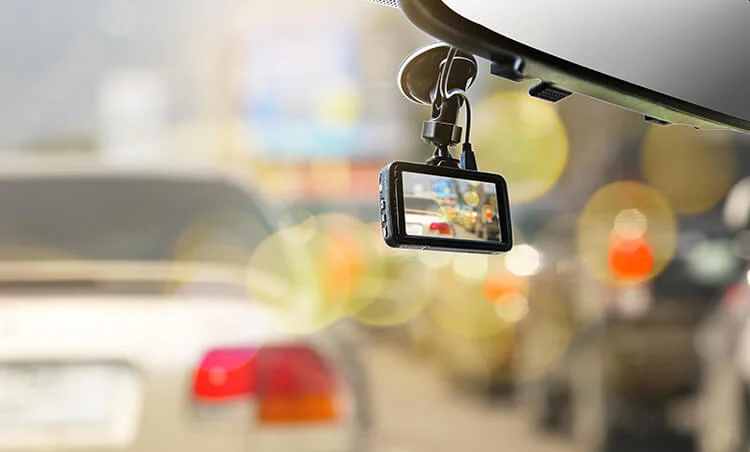Dash cams, small dashboard-mounted cameras that record events inside and outside a vehicle, have become commonplace for personal and commercial drivers. These devices provide valuable evidence in accident investigations, insurance disputes, and even capture unique moments on the road. But are dash cams legal in Louisiana? And what rules must drivers follow?
Dash cams are compact video recording devices typically mounted on a vehicle’s windshield or dashboard. They are equipped with a camera, microphone (in some models), and internal storage. Many modern dash cams also come with these features:
- Loop Recording: Overwrites old footage when capacity is reached
- G-Sensor: Detects impacts and automatically saves relevant footage.
- GPS: Records location and speed data.
- Night Vision: Captures clear footage in low-light conditions.
- Dual Cameras: Some dashcams have both front-facing and interior cameras
Legality of Dash Cams in Louisiana
Louisiana law doesn’t specifically address the use of dash cams. However, there are two key areas to consider:
- Windshield Obstruction Statutes: Louisiana law prohibits operating a vehicle with any object obstructing the driver’s “clear view” of the road. Therefore, dash cams must be placed in a way that doesn’t significantly hinder the driver’s visibility. Mounting them below the rearview mirror or on the dashboard is usually safest.
- Privacy Considerations: Recording individuals without their consent in Louisiana can raise privacy concerns. It’s essential to notify passengers if your dash cam records audio or video inside the vehicle, especially in ride-share or commercial driving situations.
Benefits of Using a Dash Cam in Louisiana
- Evidence in Car Accidents: Dash cams offer impartial footage of accidents, helping determine fault and streamlining insurance claims. This can be particularly crucial in Louisiana, a comparative fault state where compensation is affected by the percentage of blame assigned to each driver.
- Protection against Insurance Fraud: Dash cam footage can counter false accusations or staged accidents intended for insurance scams.
- Driving Behavior Improvement: Knowing their driving is being recorded can encourage drivers to adopt safer habits. Some dash cams offer features like lane departure warnings or collision alerts for added safety.
- Scenic Route Documentation: Dash cams create a travelogue of road trips, especially those through Louisiana’s picturesque bayous, historic cities like New Orleans, or festive events like Mardi Gras.
Potential Disadvantages of Dash Cams
- Evidence Against the Owner: Just as dash cams can support you in an accident, they can work against you. Footage might reveal traffic violations or demonstrate partial fault on your part.
- Privacy Issues for Passengers: Passengers may feel uncomfortable being recorded, especially without prior notice. This necessitates transparency about the presence and purposes of your dash cam.
- Potential for Theft: Since dash cams are often visible, they can become targets of theft. Consider removable models or ones with discreet designs.
Best Practices for Louisiana Drivers Using Dash Cams
- Placement Considerations:
- Mount your dash cam in a location that minimizes windshield obstruction. Below the rearview mirror or on the dashboard away from airbags are typical safe zones.
- Consult your vehicle’s manual for any airbag warning areas.
- Footage Storage and Management:
- Regularly download and back up important footage to a computer or cloud storage.
- Understand how long your dash cam retains footage before overwriting.
- Informing Passengers:
- Clearly inform passengers about the dash cam, especially if it records audio or interior video. Consider posting a visible notice in ride-share vehicles.
Additional Considerations
- Regulations for Commercial Vehicles: Some states have specific regulations for dash cams in commercial vehicles (trucks, buses, etc.). Louisiana currently doesn’t have specific commercial dash cam laws, but employers should have clear policies on their use.
- Usage of Dash Cam Footage in Court: While dash cam footage can be valuable, its admissibility in court isn’t guaranteed. Judges have discretion, and factors like camera placement, footage quality, and chain of custody can affect its use as evidence.
Examples of Dash Cam Use Cases in Louisiana
To illustrate how dash cams might be utilized in Louisiana situations, consider these examples:
- Mardi Gras in New Orleans: A dash cam could capture the vibrant parade floats and colorful costumes during Mardi Gras. However, if it’s used within a ride-share vehicle, proper passenger notification is essential.
- Scenic Drive Along the Great River Road: A dash cam could document a road trip along the historic Great River Road, which follows the Mississippi River through Louisiana, showcasing its plantations and natural beauty.
- Hit-and-Run Accident in Baton Rouge: Dash cam footage capturing a hit-and-run incident in Louisiana’s capital city could provide crucial evidence for identifying the fleeing vehicle and driver.
- Insurance Dispute Resolution in Lafayette: In an accident where fault is disputed, dash cam footage could help insurance companies determine liability and speed up the claims process.
Conclusion
Though Louisiana lacks explicit dash cam laws, these devices can be valuable tools for drivers, provided they’re used responsibly. By understanding windshield obstruction guidelines and respecting privacy, drivers can benefit from the protection and documentation dash cams offer.
It’s prudent to stay updated on any changes to Louisiana regulations concerning dash cams. If unsure about the legality or best practices, consulting with a traffic attorney is advisable.
Sources:
- Louisiana Revised Statutes Title 32, Chapter 6: Motor Vehicle Safety Equipment
- BlackboxMyCar – Are Dash Cams Legal in My Area? (https://www.blackboxmycar.com/pages/are-dash-cams-legal-in-my-area-dash-cam-laws-in-every-us-state#:~:text=Louisiana-,Louisiana,cams%20on%20your%20drivers’%20windshields.)
- Charbonnet Law Firm – Can Dash Cam Footage be Used After a Car Accident in Louisiana (https://www.charbonnetlawfirm.com/car-accidents/dash-cam-footage-louisiana-accident/)
- GPS Trackit – The Dashcam Regulations in Each State (https://gpstrackit.com/blog/what-are-the-dashcam-regulations-in-each-state/)
Disclaimer: This article provides general information and shouldn’t be considered legal advice. Laws and regulations are subject to change. Please consult with an attorney for specific legal guidance regarding dash cam use in Louisiana.



